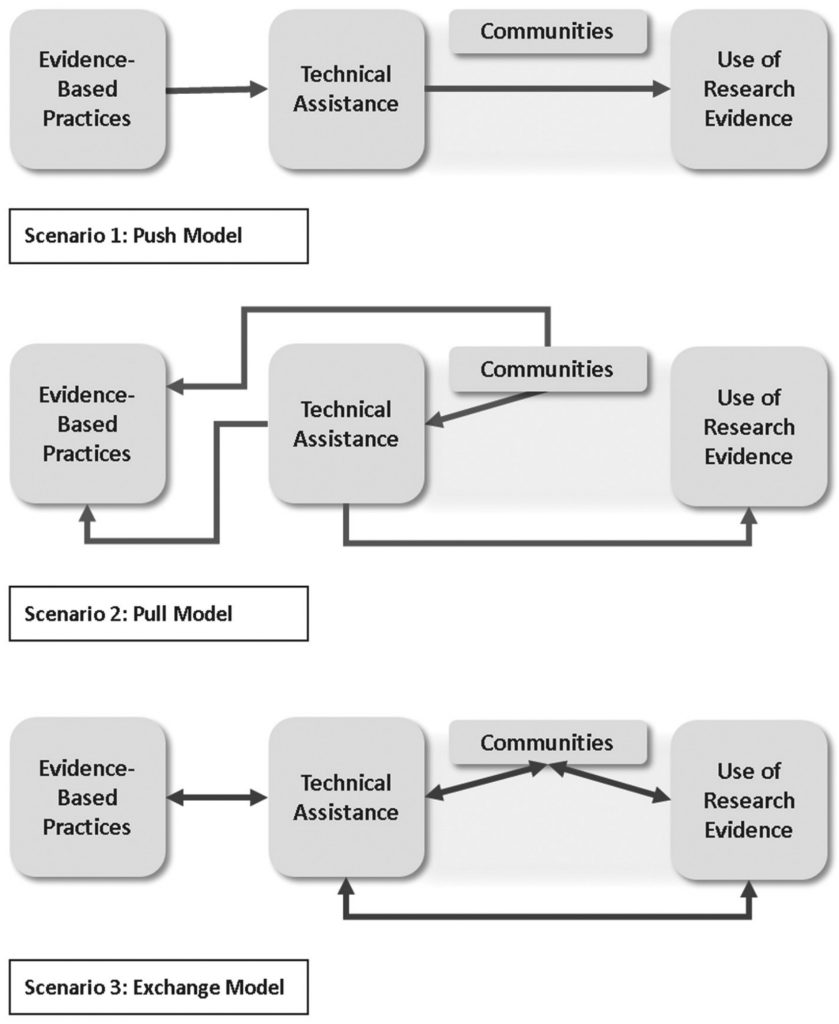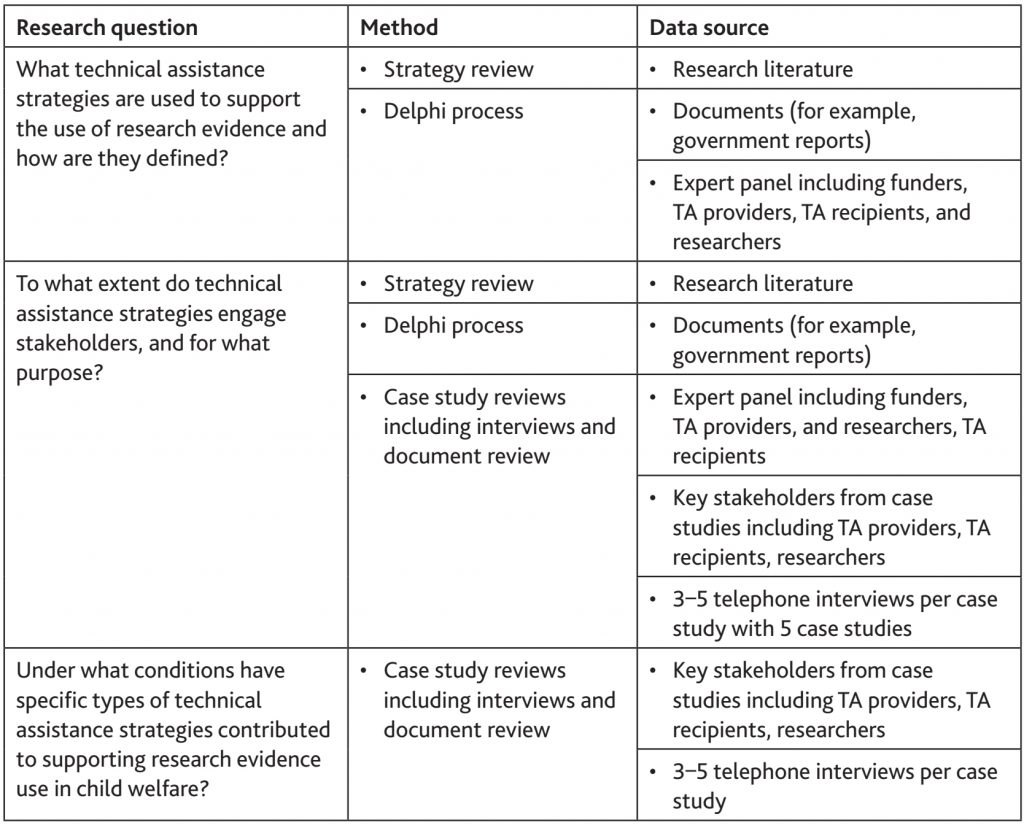
Co-creative approaches to knowledge production and implementation series (part 8): A research protocol for studying the relationship between technical assistance, evidence use, and stakeholder participation
This article is part 8 of a series of articles based on a special issue of the journal Evidence & Policy.
The authors of the fourth of the papers in the research section of the special issue, Metz, Boaz, and Powell1, present a protocol for a study of technical assistance strategies used to support the use of evidence, and, in particular, how participatory processes such as co-creation contribute to the use of evidence to improve outcomes in child and family services.
Research protocols define processes and procedures for a research study prior to its conduct. In sharing their protocol, the authors seek to extend the idea of protocol publication, which is a common feature in healthcare research, to other fields (for example, child and family services) and to different types of study designs (for example, exploratory).
They have published the protocol at the outset of the study to increase transparency in their methods. They hope that publishing the protocol will encourage discussion, strengthen the quality of reporting, improve transparency of the research, reduce the likelihood of duplications, and mitigate the challenges of study bias where only studies with positive findings are published.
Evidence use, technical assistance, and stakeholder participation
The authors advise that, despite the growing emphasis on the use of evidence-based practices and programmes to improve outcomes, the mobilisation of research evidence on the frontlines of child welfare has been quite limited, especially in public agencies serving the vast majority of children, youth and families. The use of evidence has tended to rely on a flow in one direction from research to practice, without a clear understanding of how context, community needs, and resources shape the use of research in practice. Even when service systems make the investment in evidence-based programmes, sustaining the potential of these programmes over the long term continues to be a challenge internationally. Indeed, in many jurisdictions, ‘services as usual’ remain untouched by research evidence.
A range of strategies are emerging to support the uptake of research evidence, including knowledge-brokering activities, the establishment of research networks, and technical assistance. The authors alert that individuals who provide a system of support for implementation have received minimal attention in the academic literature. These individuals reside outside of the delivery system, providing external support as an ‘outside expert’, and may be referred to as a technical assistance providers, implementation specialists, consultants, or intermediaries. There is increasing interest in understanding what these individuals do, and in what ways the external support they provide relies on participatory processes to engage key stakeholders in decisions regarding evidence use.
Given the interest in how this external support is provided, and whether this support results in greater evidence use, the research protocol focuses on technical assistance, which includes capacity building for service delivery and systems change.

Figure 1 shows the potential relationship between technical assistance, stakeholder participation, and evidence use. The authors advise that positive outcomes are the result of the interaction between evidence and the context within which the evidence is used. Therefore, it would make sense that technical assistance strategies that embrace context, rather than attempt to ignore or minimise context, would be more successful in supporting the use of evidence. Understanding context requires stakeholder participation.
Stakeholder participation concerns the involvement of individuals and organisation with a ‘stake’ in the selection and use of evidence to improve population and community outcomes. Critical stakeholders may include public agencies, funders, families, and experts. Technical assistance strategies grounded in stakeholder participation emphasise the importance of capitalising on the unique knowledge of stakeholders to develop and use the best available contextualised evidence. Co-creation, a type of stakeholder participation, is the active involvement of stakeholders in all stages of the production and implementation process, resulting in service models, approaches, and practices that are contextualised and tailored to settings.

Figure 2 describes how technical assistance strategies can promote the use of research evidence through the evolution of exchange models. Push models attempt to move research evidence into communities without a focus on community stakeholders or context. Pull models endeavour to respond to community needs through responsive technical assistance strategies, such as gathering feedback from stakeholders. However, pull models do not promote ongoing exchange between the evidence use and community context. The ‘pull’ model is used to initially determine community needs, but once these needs are determined technical assistance providers select evidence to meet these needs, and there is limited community input following that process to contextualise the evidence.
Exchange models create reciprocal dialogue among stakeholders, researchers, and technical assistance providers to improve the use of contextualised and relevant evidence in practice. The exchange happens during all phases of evidence selection, use, and improvement.
Study description
The authors advise that the study will systematically gather input from stakeholders with expertise in technical assistance to develop a compilation of technical assistance strategy terms and definitions that can be used to support the use of research evidence in child welfare. It will identify technical assistance strategies that include stakeholder involvement and assess which strategies under what conditions facilitated research use.
Four research questions will be addressed:
- What technical assistance strategies are used to support the use of research evidence?
- What are the consensus-driven terms and definitions of identified strategies?
- To what extent do technical assistance strategies involve stakeholders and for what purpose?
- Under what conditions have specific technical assistance strategies, including strategies that foster stakeholder participation, contributed to supporting research evidence use in child welfare?
The study will produce a taxonomy for technical assistance that will set the stage for further research. The taxonomy will categorise technical assistance strategies by the extent to which they are participatory and inclusive (see Figure 3) and contribute to the use of evidence-based practices through strategic processes that promote evidence use, continuous quality improvement processes, and the regular use of assessments and feedback to contextualise evidence-based practices to local populations.

A two-step methodology will be used in the study. First, a modified Delphi process with three rounds will be used to gather expert knowledge on technical assistance and address the first two research questions. The basis for the Delphi process will include strategies identified through previous studies that identified and defined implementation strategies in health and behavioural health, as well as an effort to identify competencies for implementation technical assistance providers. The Delphi process will also be used to identify case studies.
Second, case studies will be analysed through a contribution analysis methodology referred to as performance stories. Contribution analysis is a type of performance measurement used to explore the contribution an approach makes to observed results. Contribution analysis is increasingly being used to study evidence use, and is particularly relevant when assessing the contribution of complex initiatives in complex settings.
Figure 4 provides more detailed information on methods and data sources that will be used to address each research question.

Next part (part 9): Exploring boundaries and overlaps in different approaches to involving patients and family members in biomedical research.
Article source: Adapted from the paper A research protocol for studying participatory processes in the use of evidence in child welfare systems published in the Evidence & Policy special issue Co-creative approaches to knowledge production: what next for bridging the research to practice gap?, CC BY-NC 4.0.
Acknowledgements: This series has been made possible by the publication of the special issue as open access and under a Creative Commons license. The guest editors and paper authors are commended for their leadership in this regard.
Header image source: Adapted from an image by Michelle Pacansky-Brock on Flickr, CC BY 2.0.
References:
- Metz, A., Boaz, A., & Powell, B. J. (2019). A research protocol for studying participatory processes in the use of evidence in child welfare systems. Evidence & Policy: A Journal of Research, Debate and Practice, 15(3), 393-407. ↩
Also published on Medium.




